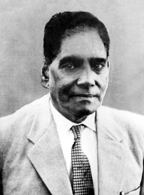Ibrahim, Justice Muhammad
Ibrahim, Justice Muhammad (1894-1966) teacher, lawyer, judge, and leader of various socio-cultural organisations, was born in September, 1894 at his maternal grandfather's house in village Shaildubi of sadarpur upazila in the district of faridpur. Son of Haji Ghiyasuddin Ahmed, he studied in Barisal Zilla School and Dhaka College, from where he graduated in 1918. He pursued his post-graduate studies in Economics and simultaneously studied Law in Dhaka Law College.

A man of liberal ideas and cosmopolitan outlook, he was influenced by the anti-British nationalist movements of the time and joined the non-cooperation and khilafat movements. He obtained a Law degree with a First class in 1921.
He practised law at Faridpur in 1922-23, and joined the Dhaka District Bar in 1924. Simultaneously, he taught Law at Dhaka University as a part-time teacher from 1924 to 1943. He was appointed Public Prosecutor in the Dhaka District Court in 1939.
Recruited as an Additional District and Sessions Judge in 1943, he served in various places in different capacities and finally was elevated to the Dhaka High Court Bench in 1950. Both as a lawyer and as a Judge he won wide popularity and esteem on account of his unfailing rectitude and freedom from the taint of communal bias.
After six years of distinguished service as a High Court Judge he retired in 1956. He was the Chairman of the Election Tribunal for a brief period and later served as the Vice-Chancellor of Dhaka University from November 1956 to October 1958.
In October 1958 mohammad ayub khan declared Martial Law in the country. Justice lbrahim, having faith in Ayub Khan's declared intentions that he would soon lift Martial Law, restore democracy, and frame a new constitution joined his cabinet as the Law Minister. As Law Minister he, with intent of protecting the interests of women, took the initiative in passing the muslim family law ordinance of 1961. This was indeed, a pioneering step for the advancement of women's rights in the country.
But the hopes of Justice lbrahim regarding Ayub's promise of restoring democracy were never fulfilled. Long before the Constitution Commission submitted its report, President Ayub Khan produced a Draft Constitution of his own ideas, prepared with the help of Manzoor Quadir, the then Foreign Minister, even without consulting the Law Minister. When the Constitution Commission submitted its report it was discussed along with Ayub's ideas set out in the Draft Constitution in several cabinet meetings. Justice Ibrahim expressed his dissenting views on most of the points in the Draft Constitution. He proposed that a Federal Government be constituted having jurisdictions over a few areas such as foreign affairs, defense and currency, with all residuary powers left to the provinces under a democratic constitution providing for direct election on the basis of adult franchise.
Though his preference was for a parliamentary form of government, he proposed that should a presidential form of government be decided upon, then the president as well as the provincial governors should be elected by the people with the additional requirement that the governor would always have to be a man of the province he was elected to serve. He also suggested the creation of the post of the vice-president so that the offices of president and vice-president should rotate between the two wings of Pakistan alternately. He also insisted on constitutional provisions for removal of the widening economic disparity between East and West Pakistan. His most radical suggestion was that regarding provincial matters, the president, in consultation with representatives of respective provinces, might frame the provincial constitution. He also asked for equal representation for the two units in the central cabinet and wanted the permanent seat of the legislature to be located in Dhaka.
In Justice Ibrahim's constitutional proposals, one could find a reflection of the prevalent mood of the people of East Pakistan for a Federal government based on consent and autonomy. All these views were rejected and he came under severe criticism from the President and his cabinet colleagues. He resigned from the cabinet on 15 April 1962.
Even after resignation he continued to express his views on the constitution, the form of government, and the necessity of removal of disparity between the two wings of Pakistan. He played a vital role in forming the Combined Opposition Party (COP) in 1964 to oppose Ayub Khan during the presidential elections.
Justice Ibrahim was an ardent and committed social worker and was devoted to upholding and promoting the literary, cultural and traditional heritage of Bengal. During the early phase of his career he was associated with the buddhir mukti andolan, 1926-1938, (Movement for Intellectual Freedom) from its inception and was the Chairman of the Reception Committee during its Ninth Annual Session held on 7 April 1935. He was the founder Chairman of the Dhaka University Old Boy's Association (now renamed as the Alumni Association), President of the Bulbul Academy of Fine Arts, Honorary Provincial Scout Commissioner, Chairman of the East Pakistan Red Cross Society, and President of the Asiatic Society of Pakistan (now Bangladesh), 1956.
A staunch Bengali nationalist, he fought tirelessly for securing the participatory democratic rights of the Bangalees of Pakistan. He will be specially remembered for his fearless role in opposing Ayub Khan's folly in promulgating an anti-people and undemocratic constitution and in opposing the General's insensitive, unjust and discriminatory attitude towards the people of East Pakistan. His dissenting voice and bold statements helped to inspire the leaders and organisers of the democratic movement launched for self-determination and for restoration of the fundamental rights of the people of this region. He passed away on 13 October 1966. [Sufia Ahmed]'
